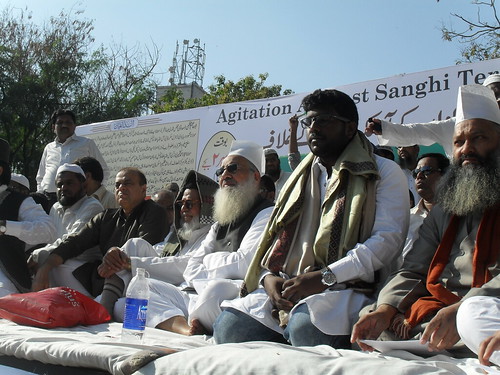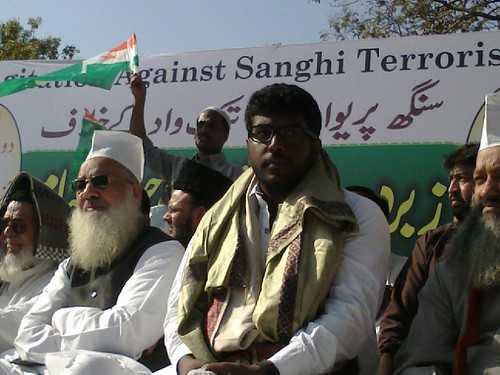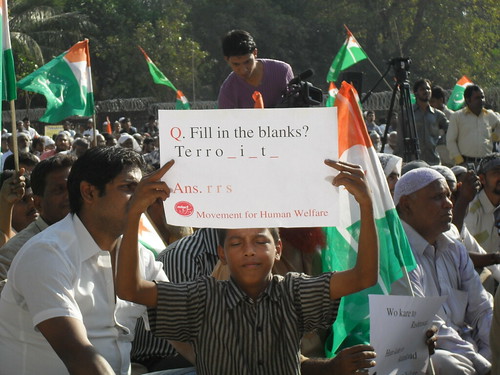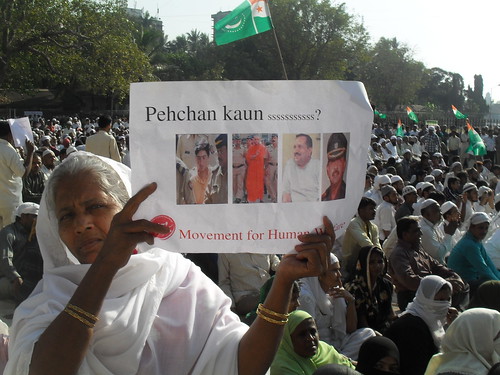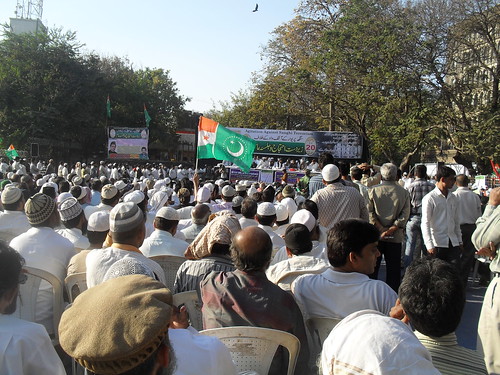Whispers have become words. Murmurs have taken form of sentences. Private conversations and personal convictions are no longer confined within the four walls of a decrepit Muslim household. A quiet sign language has been replaced by a wild scream. The guilt-soaked eyes have got new sparkle of hope and redemption. The Indian Muslim has finally got the guilt-free-pass handed by a ‘devout’ Hindu priest Swami Aseemanand of Dangs, Gujarat.
Aseemanand’s judicial confession – that he and his Hindutva men were responsible for five major bomb blasts – has opened Pandora’s Box. The bees of the box have stung so many men in Khakhi. One confession has destroyed the credibility of countless police officers. It is safe to assume that Rajwardhan, the then Rural SP of Nasik, did not sleep properly on Friday night. He weaved a dangerous fictional tale in order to implicate 11 innocent Muslims in Malegaon’s 2006 blasts. It is equally safe to assume that the conscience of former ATS chief KP Raghuvanshi must be cursing himself. It was Raghuvanshi who proudly displayed sketches of two suspects who bought new cycles. How conveniently he forgot the fact that the sketches don’t match with the bearded Muslims languishing in jail! How conveniently he forgot the fact that Shabbir Masiullah, one of the accused, was already in Mumbai police custody since many months before the blasts! How conveniently he forgot the fact that Noorul-Huda, the accused number one, was under close police watch since many years!
Aseemanand’s confession has brought open the divide within the CBI. The confession is an indictment CBI as well. CBI blindly followed the footprints of KP Raghuvanshi when it filed a supplementary chargesheet in Malegaon 2006 blasts repeating the lies woven by ATS. How conveniently CBI relied on ATS theory that Zahid, the Imam of Phoolsavangi, planted bomb when he was leading Friday prayers hundreds of miles away! It is altogether a different matter that Aseemanand was arrested by CBI! Therefore it can be safely assumed that there are two kinds of CBI; one highly communal and the other secular. Does CBI stand for Communal Bureau of Investigation?
Harish Gupta, the then Hyderabad Joint Commissioner of Police, took inspiration from KP Raghuvanshi when he falsely implicated 19 Muslims in Mecca Masjid blast case.
The role of RSS has come on spotlight after Aseemanand’s confession. Ram Madhav, RSS spokesman, has said that confession was given under “duress”. He should know that it’s a judicial confession recorded as per the guidelines laid down in Section 164 of Criminal Procedure Code which says that confessions recorded before a magistrate are legally admissible evidence. Pakistani terrorist Ajmal Kasab had given confession under the same section. It is very difficult to retract the confession given under this section. If one retracts confession then it is quite possible that perjury charges will be slapped on him. Retired Bombay High Court judge Justice Hosbet Suresh is of the opinion that the accused can retract his statement. In a recent interview Justice Suresh remarked, “Even if the prosecution relies on it, the magistrate who recorded the confession is summoned and he will give evidence in the court. The magistrate can be cross-examined”.
The communal and biased role of investigating agencies must be fully examined by Prime Minister Manmoham Singh. There is an urgent need for a legislation which will hold our investigating agencies accountable for their misdeeds. Delivering the Fourth R.N. Kao Memorial Lecture on January 19, 2010 organised by the Research and Intelligence Wing (RAW), Vice-President Hamid Ansari had called for greater “oversight and accountability” in the operations of the country’s intelligence agencies. He had suggested setting up of a standing committee of Parliament on intelligence. He passionately argued that just like other democracies like the United States and the United Kingdom, the “concerned agencies should make public their mission statement, outlining periodically their strategic intent, vision, mission, core values and their goals”. It is high time to implement the suggestion of Hamid Ansari.
Similarly we need to have a mechanism in place whose job is to keep watch that no innocent is falsely accused on terror charges. 32 Muslims have been wrongly imprisoned on terror charges. Four years of incarceration has ruined their lives; their families had literally given up the hope that they will get justice. It remains to be seen how the Indian government is going to right the wrongs done by law-enforcing agencies. Will the offending police officers be booked under the same stringent laws which were abused by them? This will be the biggest test of Indian democracy.
Indian Muslim’s quest for inclusion in new India will remain a dream unless the guilty police officers are punished. The average Indian Muslim is still trapped between two keywords: Justice and survival.
From Mubashir Mushtaq's article in Inquilab. More Here





